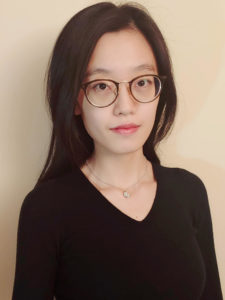DAC Student Spotlight: Tianyi Li

Tianyi Li, DAC Ph.D. student in computer science
How do we form our opinions? How do we develop the mental models that make us different and unique?
Finding answers to these questions is what drives Tianyi Li’s research at the Discovery Analytics Center. As a Ph.D. student in computer science, her research interests include human-computer interaction (HCI), collective (crowdsourced) intelligence, visual analytics, and explainable artificial intelligence (AI).
“I have always been interested in human cognition and intelligence, especially the sensemaking process,” said Li, who is advised by Chris North at DAC and co-advised by Kurt Luther. “Studying computer science during my undergrad years at Hong Kong University made me think deeper about the relationship between human and computing intelligence. I am excited by how much computer science has been advancing our understanding of the black box of human intelligence by developing smarter and human-friendly technologies.”
Li’s thesis work is focused on how to modularize the complex sensemaking process so that many distributed agents can contribute to suitable components asynchronously and meaningfully. Specifically, Li explores, incites, acquires, and structures the wisdom of crowds to help make sense of the rapidly growing and dynamically changing information about the world. To achieve this goal, her work combines sensemaking theories, crowdsourcing techniques, and visual analytics tools to develop theories and applications for intelligence analysis.
“I like the great support I have in DAC,” said Li. “Many professors and students sit in the same area. Everybody is friendly, smart, and helpful. I am also benefiting a lot from my talented lab mates from diverse backgrounds and brilliant advisor Dr. North. The great lab atmosphere is really helping me grow into a more confident and mature researcher.”
Next month, Li will be at the ACM IUI 2019 conference in Los Angeles to present “What Data Should I Protect? Recommender and Planning Support for Data Security Analysts.” Last November, she presented the paper, “CrowdIA: Solving Mysteries with Crowdsourced Sensemaking,” at the 21st ACM Conference on Computer-Supported Cooperative Work and Social Computing (CSCW).
During an internship at Cloudera in Palo Alto, California, last summer, Li conducted interviews with data science practitioners in industry to collect user requirements and identify opportunities for leveraging interactive visual support and developed a prototype system called HyperTuner that supports hyper parameter search and analysis via interactive visual analytics.
In the summer of 2017, Li interned at Informatica in Redwood City, California. Her work there involved identifying what data is worth protecting and building an impactful plan to protect it. “I implemented a system prototype through four iterative design and evaluation cycles by applying user-centered design to this new domain of data security applications,” she said.
Li’s projected graduation date is Spring 2020. She said that based on her experience so far, she likes working both in academia and in industry. “Right now, I am just trying to work hard to keep both doors open until I finally decide which one to commit to,” she said.